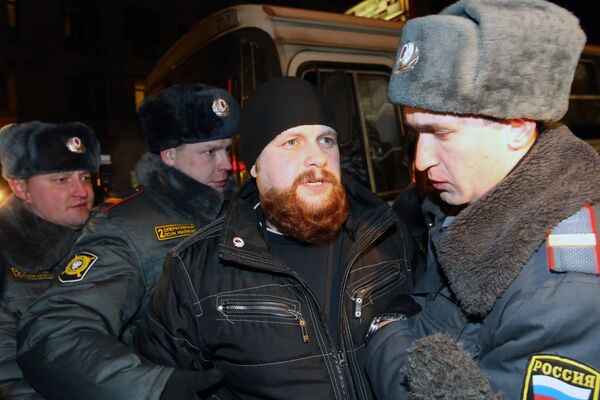The leaders of two outlawed Russian ultra-nationalist movements have praised Chechnya as a role model for the rest of the country after a visit to the North Caucasus republic and a meeting with its controversial leader, Ramzan Kadyrov.
The visit by the two ultra-nationalist leaders was designed to defuse tensions between ethnic Russians and migrants from North Caucasus republics.
Slavyansky Soyuz leader Dmitry Demushkin and DNPI (Movement Against Illegal Immigration) head Alexander Belov also met with other senior officials, including the republic’s parliamentary speaker and its finance minister, during a visit that lasted just under a week.
In an interview with Gazeta.ru, Demushkin said that Kadyrov - a former militant accused of a range of human rights abuses - had built a “model nation”
“We - as Russian nationalists - would like to have the same at home,” he added.
Both men said they were impressed by the lack of drunks on the street and by the absence of fast-food restaurants. Alcohol is only allowed to be sold in Chechnya from 8am-10am. In practice, beer, wine and spirits are extremely hard to locate, even during the approved hours.
Demushkin also said that they had met with Kadyrov at his heavily-guarded residence and that their discussion had lasted until five in the morning. Belov called Kadyrov, 34, a “young, audacious and very wise person.”
Under Kadyrov, the Chechen capital of Grozny has been entirely reconstructed since the two separatist wars that tore the republic apart in the 1990s and early 2000s.
Critics however accuse Kadyrov, who fought against Russian in the First Chechen War, of encouraging a cult of personality and the brutal suppression of dissent, as well as attempting to impose hardline Islam on the republic. Kadyrov denies the allegations.
The head of the Moscow-based Sova monitoring group, which collects information on racist attacks and xenophobia in Russia, questioned however the value of the visit.
“It would have been understandable if we had an organized war between two sides and the nationalists were representatives of one of them,” Sova head Alexander Verkhovsky said, stressing that neither Demushkin, nor Belov enjoyed any real authority among radical nationalists.
Some 5,000 nationalists and football hooligans rioted near Red Square late last year after the death of a Muscovite fan during a brawl with Chechen youths. President Dmitry Medvedev called the disturbances a threat to Russia’s stability.


